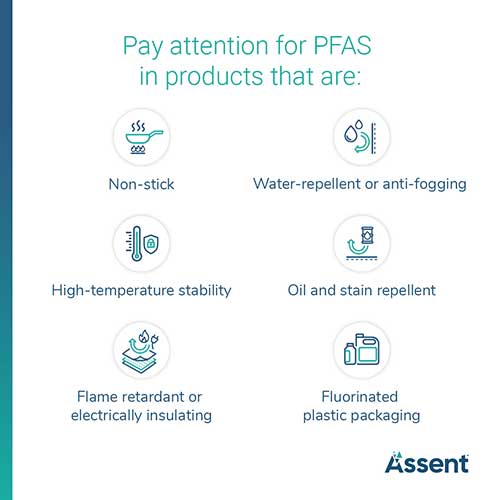Manufacturers must prepare proactively as PFAS are phased out of supply chains and vital parts become obsolete.
By Cally Edgren, Director, Sustainability, Assent
The elimination of per- and polyfluoroalkyl substances (PFAS) will cast a wide net, impacting manufacturers across industries, including transportation, automotive, construction, manufacturing, and more. Those with finished products that rely on PFAS and their unique properties — and manufacturers that require PFAS-containing materials and spare parts to maintain their equipment, processes, or employee personal protective equipment (PPE) — will need to take action as the chemicals are phased out and parts become obsolete.
Regulators are increasingly restricting the use of PFAS in both processes and products. Companies that want to continue selling products in these markets will need to respond to the hundreds of new laws controlling PFAS use.
Updates to PFAS restrictions impact even the world’s biggest companies, like 3M, one of the largest manufacturers of these chemicals. They are phasing out all PFAS manufacturing while also working to discontinue PFAS use across their portfolio by 2025.
But beyond the regulations themselves, manufacturers like 3M are increasingly driven by other forces:
This is a “regulation scope-proof” issue and manufacturers across all industries will be affected. While this statement may seem shocking, it’s actually an understatement. PFAS are found in so many different products (not to mention manufacturing processes and equipment and employee PPE), that it will be nearly impossible not to feel the impact of 3M’s decision, among others.
Early obsolescence of chemicals, materials, and parts will result in manufacturers no longer being able to source the substances and components they need. If equipment and processes can’t be maintained, such as the use of PFAS chemicals in a plating operation, the impact could even drive capital expenditures to purchase new machinery.

This is not an issue companies can wait out, nor will anyone be able to avoid the consequences of parts obsolescence. Identifying PFAS in your purchased materials will be complex because of the combination of family of substances’s size and the patchwork of hundreds of regulations in different jurisdictions. Waiting to get started on this process could cost precious time needed for strategic planning. It is a unique challenge for manufacturers across the industry spectrum. How one grapples with it will make all the difference. Companies that have based their previous compliance programs mainly on regulatory deadlines may not be prepared for all of these other drivers forcing action well ahead of the regulations.
Preparation to meet these challenges will provide a competitive edge. Those who embrace the opportunity to redesign their products and processes and adjust will be able to pivot and deliver. Those who, instead, try to wait out the problem will only find themselves scrambling to acquire parts at exorbitant prices and redesigning both products and processes.
PFAS parts obsolescence is coming; there is no debate or confusion. How you respond, though, can make all the difference.
This article is sponsored by Assent.

About the Author:
Cally is a proven compliance program leader with experience developing, communicating, and executing company goals and strategies. She is a subject matter expert on product materials compliance as well as market access certifications and has a background in program and process development to support regulatory compliance requirements. Cally possesses over 27 years of experience in developing and managing global compliance programs at Rockwell Automation and Kohler Co. She supports Assent’s strategic direction and guides clients through product compliance topics and issues, including PFAS.
For more information, please contact:
Assent
info@assent.com
Scott Ellyson, CEO of East West Manufacturing, brings decades of global manufacturing and supply chain leadership to the conversation. In this episode, he shares practical insights on scaling operations, navigating complexity, and building resilient manufacturing networks in an increasingly connected world.